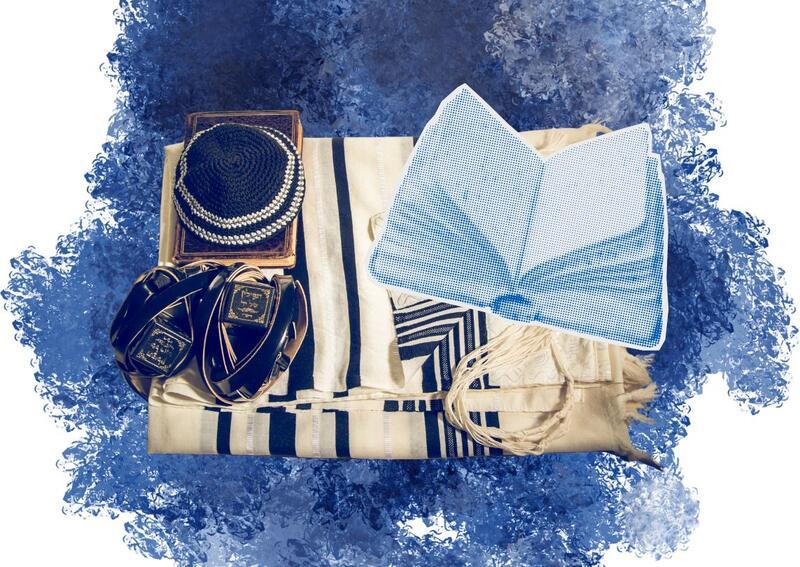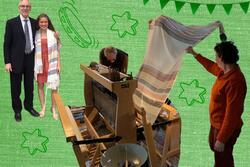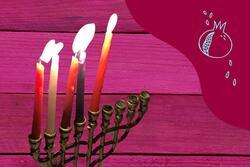The Question that Sparked My Jewish Journey
I loved going to Shabbat morning services as a kid, but not for any of the reasons you might think. The prayers, the sense of community, the kiddush lunches—they were all fine, but they weren’t the reason I kept coming back. Instead, I looked forward to shul for the hours and hours of reading time! I had a secret nook, on the gray, carpeted floor in the hallway outside the sanctuary, where I could hide away and read my various fantasy novels.
Of course, Judaism was always important to me on some level: I constantly sang Hebrew songs around the house, loved Shabbat dinners, and enjoyed feeling connected to something greater than myself. But I hadn’t thought much about my own Jewish identity. If you would have asked my elementary school self why she was Jewish, she simply would have responded, “Because my parents are. Duh.”
One conversation in sixth grade changed that. I was perusing the shelves of colorful spines in my middle school’s library, as I did after school almost every day. On this particular day, I walked to the checkout counter with a huge stack of books piled precariously high in my hands. The librarian approached me. “That’s a lot of books, Yona!” she exclaimed.
“Well, of course,” I responded. “Rosh Hashanah starts tomorrow. That means two full days in synagogue! I’m going to be able to read all of these books in that much time!”
The librarian wasn’t Jewish and she looked at me, confused. “Aren’t the days of Rosh Hashana holy days? Why would you read during them? I can’t imagine reading in church!”
I checked out the books and then continued about my day, but the librarian’s question lingered in my mind. I thought about it as I heard the shofar blast on Rosh Hashanah, and as I tried to actively engage with the service on Yom Kippur. The question stuck with me after the holidays as well, as I began studying for my bat mitzvah.
Looking back on it now, I can see that that moment in the school library was the first time that I had ever been forced to reflect on my Judaism. Until that point, I hadn’t thought much at all about why I engaged with Judaism—or even why I was Jewish beyond having been born that way. I began swapping my novels during services for siddurim (prayer books), asking questions about Jewish belief and practice, and exploring Judaism on my own terms.
Eventually, I identified many aspects of Judaism that felt important to me. At summer camp, nature, meditation, and song all became portals into a Judaism that felt uniquely mine. At Hebrew school, I sank into text study with peers and found out how much I loved making connections between historical Jewish figures and ideas and my own life. For my bat mitzvah, I actively leaned into reading Torah, learning to lead Shabbat services, and wrapping tefillin. As I did, I realized how much I valued egalitarianism and equal voices for women in prayer.
As I get older, I’ve continued this exploration—of my Jewish identity and, really, of myself. It has led me to many incredible places, including to JWA, where I am able to combine my now very active role in Judaism with my passion for feminism and interest in writing.
Today I still love going to Shabbat morning services. As I walk to shul, I spend those blocks rehearsing the tunes I’ve selected for the Musaf Kedusha that day or reviewing the trope of my Torah reading one final time. I arrive at synagogue with my tallit bag in hand, which always contains not only my tallit but also my kippah, yad, siddur, and yes, whatever fiction book I am reading at the moment, just in case.
While I still occasionally read in shul, I feel proud to say that I love to think and talk about what Judaism means to me or why I am Jewish. I anticipate that my feelings about Judaism will continue to evolve as I meet new people, gain different perspectives, and mature as a person. For now, though, I feel so grateful for that day back in 6th grade when my school librarian asked a simple but thought-provoking question. It’s amazing that sometimes a single moment can spark radical change.
This piece was written as part of JWA’s Rising Voices Fellowship.






